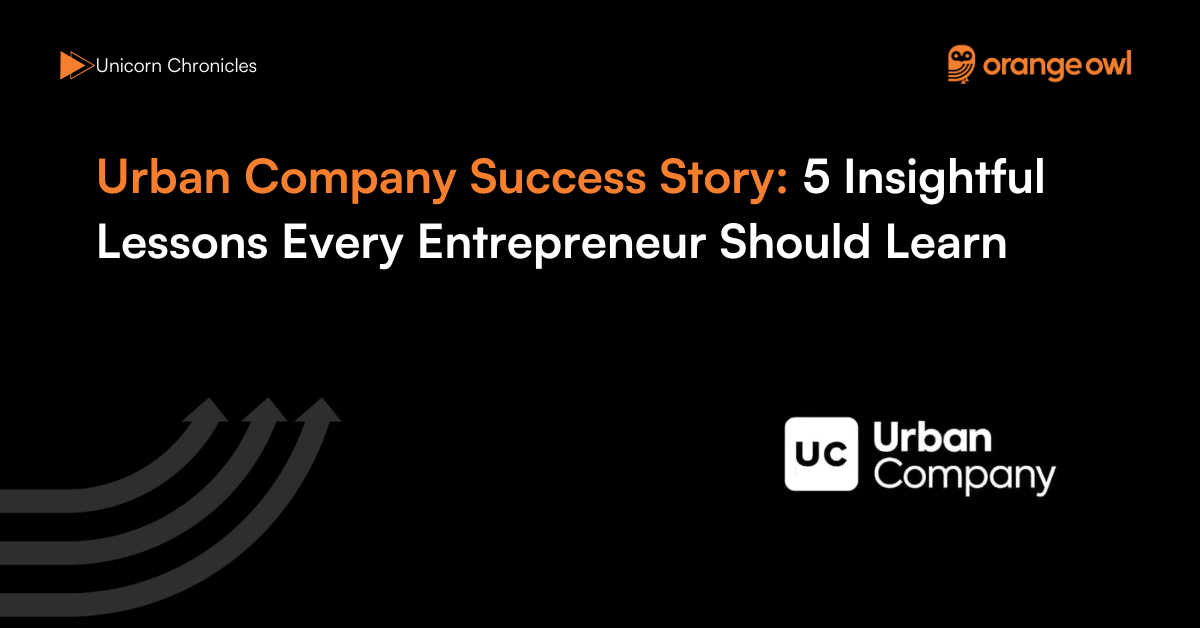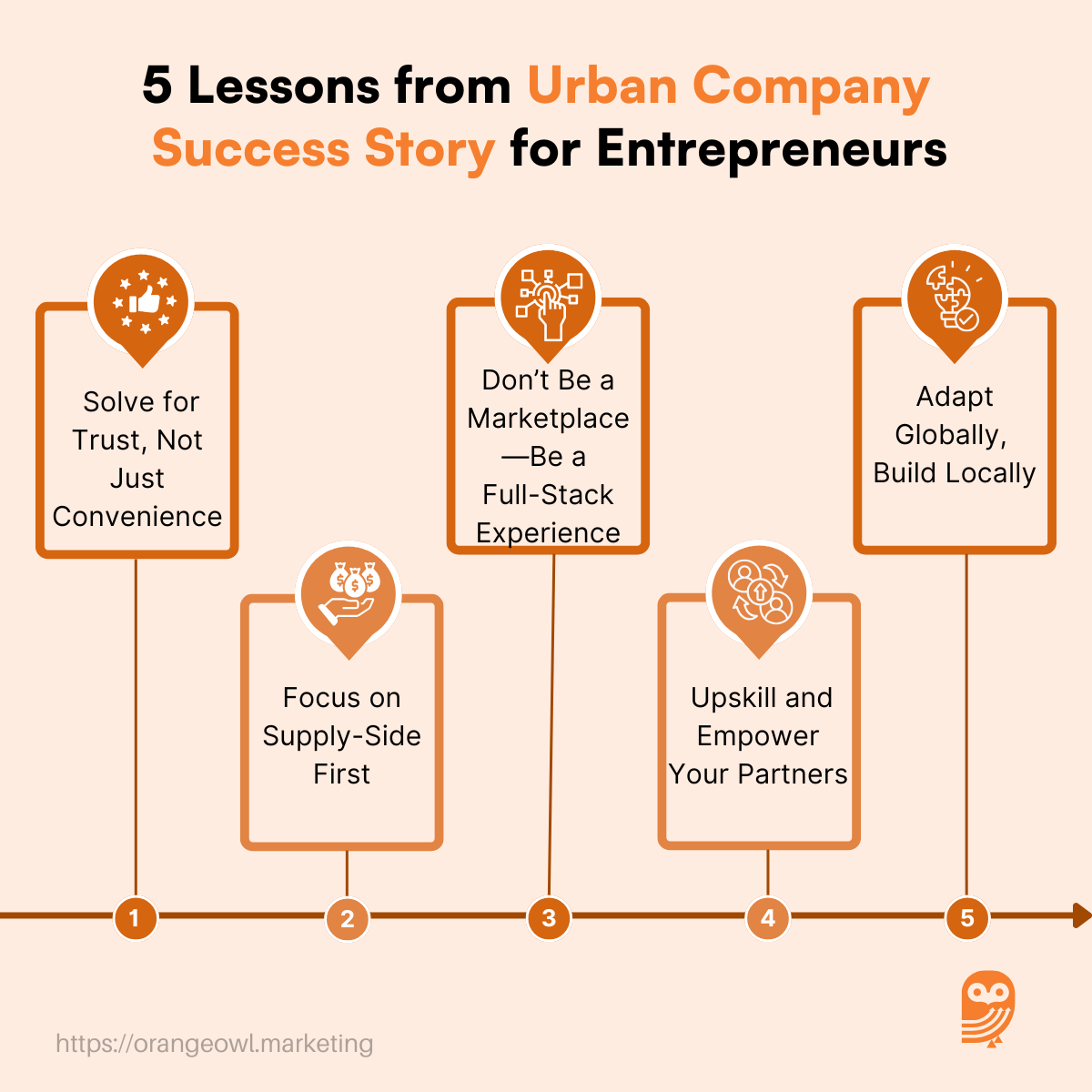Urban Company Success Story: 5 Insightful Lessons Every Entrepreneur Should Learn
Vivek Goel
May 30, 2025

Table of Contents
Introduction
In today’s fast-paced urban environment, where time is of the essence and trust is crucial, Urban Company (formerly UrbanClap) has established itself as a leading platform for on-demand home services. Founded in 2014 by Abhiraj Singh Bhal, Varun Khaitan, and Raghav Chandra, the company set out to revolutionize the fragmented home services sector in India by providing a seamless, reliable, and tech-driven solution for hiring professionals across various categories, including beauty, cleaning, repairs, and wellness.
As of March 2025, Urban Company operates in over 60 cities across India, the UAE, Singapore, and Saudi Arabia, with a robust network of more than 55,000 trained service professionals. The platform facilitates approximately 2.2 million monthly orders, reflecting its widespread adoption and customer trust.
Financially, Urban Company has demonstrated impressive growth. In the fiscal year 2023–24 (FY24), the company’s revenue surged by 30% year-on-year, reaching ₹827 crore, up from ₹637 crore in FY23. Moreover, the company significantly reduced its losses, with the loss before tax narrowing to ₹93 crore in FY24 from ₹312 crore in the previous fiscal year . In the first quarter of FY25, Urban Company achieved a profit before tax of ₹12 crore, marking a pivotal moment in its journey towards profitability
Urban Company’s commitment to quality and partner empowerment is evident in its substantial investments in training and upskilling. Since its inception, the company has invested over ₹250 crore in training programs, ensuring that service professionals deliver consistent and high-quality experiences to customers.
With a valuation of approximately $2.8 billion as of December 2021 , Urban Company stands as a testament to how technology, trust, and a customer-centric approach can transform traditional service industries. As the company continues to expand its footprint and refine its offerings, it serves as an inspiring blueprint for entrepreneurs aiming to innovate in conventional sectors.
Origin Story
The inspiration for Urban Company was rooted in a simple yet widespread urban pain point: finding trustworthy and skilled service professionals. While booking a cab or ordering food had become effortless with the rise of platforms like Ola and Swiggy, securing a reliable plumber, beautician, or AC repair technician remained a frustrating ordeal. This realization struck co-founders Abhiraj Singh Bhal, Varun Khaitan, and Raghav Chandra during casual conversations about everyday inconveniences.
In an interview, Abhiraj Bhal recalled,
“It was easier to get a pizza delivered in 30 minutes than to get a plumber to your house in three days.”
This stark contrast between technology-driven convenience and unorganized service sectors motivated the trio to build a platform that could bridge the gap.
Backed by their experiences in consulting (Abhiraj and Varun were former BCG consultants) and engineering (Raghav was a software developer at Twitter), they envisioned a full-stack marketplace. This meant Urban Company would not just connect users to professionals—it would own the entire service experience, including onboarding, training, pricing, bookings, fulfillment, and payments.
The founding principle was clear: offer standardized, high-quality, and timely services, backed by a layer of accountability. The mission was to transform how home services were delivered in urban India—and eventually, globally.
Business Landscape and Early Challenges
When Urban Company launched in 2014, the home services market in India was completely unorganized. The sector was riddled with inconsistencies—unverified professionals, poor service quality, no pricing standards, and zero customer trust.
“The biggest challenge was building credibility in a market where trust simply didn’t exist,” said Abhiraj Bhal.
Customers were understandably skeptical about letting unknown individuals into their homes, especially for personal services like beauty or massage. At the same time, professionals were hesitant to join a platform that demanded process discipline, training, and transparency.
To solve this chicken-and-egg problem, Urban Company prioritized building the supply side of the marketplace. The team went door-to-door, convincing electricians, plumbers, and beauticians to join the platform, promising them higher and more consistent earnings. “We realized that demand was not the problem—India’s growing middle class was ready to pay for convenience. But if the supply wasn’t trained or professional, demand wouldn’t matter,” explained Abhiraj
The company invested early in training centers and onboarding protocols, vetting professionals for skills, behavior, and hygiene. In a 2024 annual report, Urban Company revealed it has invested over ₹250 crore in training programs over the years, underlining its long-term commitment to quality.
They also created a rating and feedback loop to ensure continuous improvement, something the unorganized sector sorely lacked. Despite resistance from traditional service providers and some early operational failures, the company stuck to its customer-first playbook.
Slowly but steadily, Urban Company built what many others had failed to—a reliable, scalable, and tech-enabled trust layer in home services. As the founders often say, “We weren’t trying to build a feature. We were trying to build a habit.”
Growth Strategies
Urban Company’s growth trajectory was shaped by decisive strategy, technological innovation, and a razor-sharp focus on user experience. In its early days, the company operated as a relatively open marketplace, allowing users to browse through professionals and select one based on ratings and reviews. But the founders soon realized that this model lacked control over quality—a core component of building lasting trust.
So, Urban Company made a pivotal shift to a full-stack model. This meant taking complete ownership of the service experience, including setting standardized pricing, enforcing SOPs (standard operating procedures), and offering extensive training to professionals. “By going full-stack, we could guarantee the kind of quality that a brand needs to stand for,” said co-founder Abhiraj Bhal in an interview with The Economic Times.
The company also scaled geographically, moving beyond Tier-1 cities and entering Tier-2 urban centers, where rising disposable incomes were fueling demand for convenience-based services. International expansion followed soon after—Urban Company entered the UAE in 2018, where it replicated its India playbook with localized adjustments. According to Inc42, the company now operates in over 50 cities across India and 5 cities internationally, including Dubai and Abu Dhabi.
A major engine behind this expansion was their investment in Urban Company Partner Training Institutes. These centers provided not just technical upskilling, but also lessons in grooming, hygiene, communication, and even smartphone usage. As of 2023, over 40,000 partners had undergone formal training, with more than 300 trainers employed full-time.
Technology, of course, was the invisible glue. The company used AI-driven analytics to forecast demand, dynamically adjust pricing, and optimize time slots.
“Our product isn’t just the app—it’s the professional showing up at your door. That experience needs to be flawless,” Bhal emphasized. From auto-scheduling and smart routing to push notifications and loyalty rewards, every feature was aimed at making the service seamless for both users and professionals.
Marketing Strategies
Urban Company’s marketing success was anchored in trust-building and positioning itself as a premium, reliable brand in a fragmented industry. Its earliest campaigns focused on solving common urban annoyances—leaky taps, unkempt hair, or dirty sofas—with just a few clicks. The company’s messaging was clear: “professional help is now just a tap away.”
One of their most effective campaigns, #GoProfessional, spotlighted the transformation of service partners from informal workers to trained, empowered professionals. It highlighted not just customer convenience, but also the social upliftment of the workforce. This narrative helped build emotional resonance with users while instilling brand credibility. In Bhal’s words,
“We weren’t just marketing services—we were building aspirational careers for thousands of partners.”
To enhance visibility and digital trust, Urban Company made content marketing a core pillar. They shared behind-the-scenes footage of training sessions, showcased customer transformations, and featured expert-backed advice on wellness and grooming. This transparency helped humanize the brand and reinforce quality assurance.
The company also partnered with influencers, fitness and lifestyle bloggers, and Instagram creators to reach urban millennials and Gen Z users—their key demographic. These influencers often demonstrated real-time bookings, hygiene protocols, and the convenience of the platform, making it relatable and trustworthy.
Hyperlocal marketing was another key element. The brand adapted its tone, language, and offerings based on city-specific nuances. From localized Google Ads to city-wise promotional offers and regional festivals, Urban Company ensured relevance across geographies. “You don’t build a national brand by being generic—you do it by being local in many places,” Abhiraj Bhal wisely noted.
5 Insightful Lessons Every Entrepreneur Should Learn
1. Solve for Trust, Not Just Convenience
In sectors like home services, where customer experience involves inviting strangers into their personal spaces, convenience alone isn’t enough. Trust becomes the real currency that drives long-term loyalty. Urban Company understood this early on and made it a cornerstone of their business model. Rigorous background checks, identity verification, and continuous training helped establish a trustworthy ecosystem. This wasn’t just lip service — the company took end-to-end ownership of quality and service delivery, reassuring customers at every touchpoint.
As co-founder Abhiraj Bhal said, “Trust is built when you take ownership of quality—end-to-end.”
This relentless focus on trust helped Urban Company differentiate itself in a fragmented market and build lasting customer relationships.
2. Focus on Supply-Side First
While many startups obsess over rapid user acquisition, Urban Company’s founders knew that the foundation of any service marketplace lies in a robust supply side. Without a pool of skilled, reliable professionals, even the most elegant app will falter. Urban Company prioritized partner vetting, onboarding, and continuous upskilling, transforming service providers into brand ambassadors who delivered consistently high-quality experiences. This supply-side focus helped reduce cancellations and complaints, ensuring positive word-of-mouth growth.
Reflecting on this, Bhal noted, “Without a strong supply base, even the best tech product will fail.” Entrepreneurs should internalize this lesson and remember that demand without dependable supply is unsustainable.

3. Don’t Be a Marketplace—Be a Full-Stack Experience
Urban Company didn’t want to be a mere middleman connecting customers and professionals; it aspired to own the entire customer journey. From booking and payment to service execution and aftercare, the company built a full-stack service ecosystem that maintained control over every interaction. This approach allowed them to standardize pricing, enforce quality controls, and introduce value-added services such as partner insurance and service guarantees.
According to Abhiraj Bhal, “We realized that control drives consistency, and consistency drives trust.” Entrepreneurs should consider how going beyond simple marketplaces to deliver full-stack experiences can create defensible moats and superior customer satisfaction.
4. Upskill and Empower Your Partners
Rather than relying solely on gig workers with transient loyalties, Urban Company made a conscious decision to invest in their partners’ growth and welfare. Through its Partner Training Institutes, the company provided skill development, grooming, customer service training, and digital literacy courses. Additionally, it offered benefits like health insurance and financial products, fostering a sense of ownership among partners.
“We want to create millions of micro-entrepreneurs, not gig workers,” said Bhal, emphasizing the vision to build a sustainable and motivated workforce. This lesson underscores the importance of nurturing the people behind your product as stakeholders, which can drive higher engagement and better service outcomes.
5. Adapt Globally, Build Locally
Urban Company’s international expansion into the UAE and other markets showed that scaling globally requires local adaptation, not mere replication. Consumer behaviors, regulatory environments, and service expectations vary widely, and the company took deliberate steps to customize offerings, pricing models, and marketing campaigns for each region.
“You have to localize your operations while keeping your global vision intact,” Bhal advised. This balance between global ambition and local sensitivity is crucial for startups looking to expand beyond domestic borders. Entrepreneurs should avoid a one-size-fits-all approach and invest in understanding local nuances deeply.
Conclusion
Urban Company’s transformation from a bootstrapped startup in Delhi to a global, multi-billion-dollar platform is more than just a story of growth—it’s a testament to visionary leadership, deep consumer insight, and an unwavering commitment to quality. At a time when the home services sector was considered too disorganized to scale, the founders of Urban Company chose to challenge the norm. They combined technology with empathy, and structure with scalability, to deliver trusted, high-quality services directly to people’s homes.
What truly sets Urban Company apart is its ability to create value for all stakeholders—customers, service professionals, and the broader ecosystem. By building training institutes, offering financial inclusion, and standardizing quality across services, they didn’t just build a tech platform—they built a dignified career path for thousands of blue-collar workers, turning them into micro-entrepreneurs.
Their strategic shift to a full-stack model, international expansion with localized strategies, and sustained investment in customer experience and partner empowerment make Urban Company a model of modern entrepreneurship. They’ve shown that even in traditional, highly fragmented industries, disruption is possible—when built on the right foundation.
As co-founder Abhiraj Bhal aptly puts it:
“We’re not just building a company—we’re building an ecosystem where quality wins, professionals thrive, and customers are at peace.”
For entrepreneurs, Urban Company is more than an inspiring success story—it’s a blueprint for building scalable, meaningful, and socially responsible businesses in today’s dynamic world.


